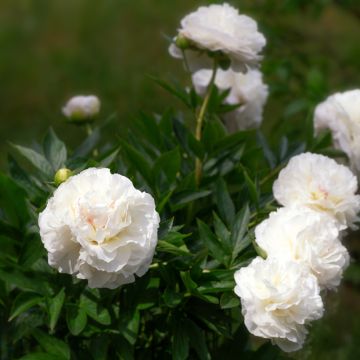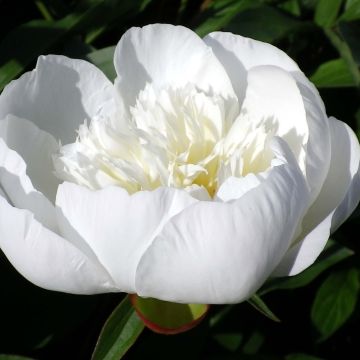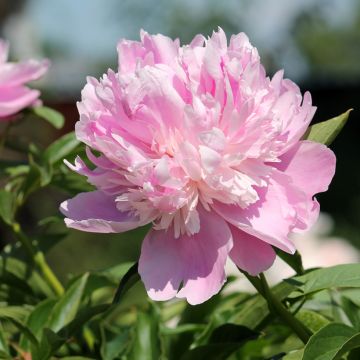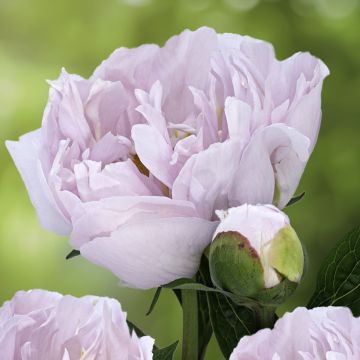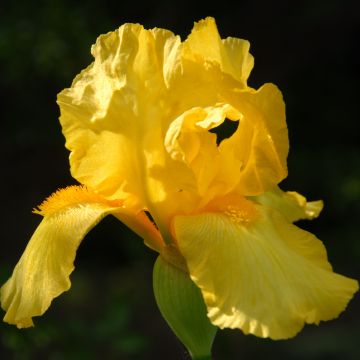

Paeonia x lactiflora Dynasty - Chinese Peony
Paeonia x lactiflora Dynasty - Chinese Peony
Paeonia x lactiflora Dynasty
Chinese peony, Common peony, Garden peony, Herbaceous Peony
Special offer!
Receive a €20 voucher for any order over €90 (excluding delivery costs, credit notes, and plastic-free options)!
1- Add your favorite plants to your cart.
2- Once you have reached €90, confirm your order (you can even choose the delivery date!).
3- As soon as your order is shipped, you will receive an email containing your voucher code, valid for 3 months (90 days).
Your voucher is unique and can only be used once, for any order with a minimum value of €20, excluding delivery costs.
Can be combined with other current offers, non-divisible and non-refundable.
Why not try an alternative variety in stock?
View all →This plant carries a 12 months recovery warranty
More information
We guarantee the quality of our plants for a full growing cycle, and will replace at our expense any plant that fails to recover under normal climatic and planting conditions.
Would this plant suit my garden?
Set up your Plantfit profile →
Description
The Paeonia lactiflora 'Dynasty' is a herbaceous peony sought after for its fragrance and its magnificent pastel flowers resembling roses. This variety is renowned for its superb range of tender colours, ranging from soft pink to creamy white. A colour that it shares with few other varieties. 'Dynasty' blooms late, in June, to beautifully conclude the peony season.
Chinese peonies are herbaceous perennial plants mainly derived from Paeonia lactiflora, a species native to Central and Eastern Asia (from eastern Tibet, northern China, to eastern Siberia). In nature, this peony grows in woods and meadows. This plant belongs to the family of Paeoniaceae.
The 'Dynasty' peony was obtained in 2014. It forms a beautiful clump of vegetation that can reach 85-90 cm in height. Its beautiful rose-shaped flowers with a diameter of 13-14 cm bloom in mid-June. Each one displays a superb range of colours, ranging from pale bluish pink on the outer petals to creamy white near the centre. In spring, the young shoots that emerge from the ground are a brilliant purple. The stems bear large, dark green leaves, divided into segments, measuring 15 to 20 cm long. The entire vegetation disappears in winter, while the buds persist at ground level and will develop in spring. This very perennial plant grows from a large, fleshy root that does not appreciate being moved.
Incredibly attractive and fragrant, the 'Dynasty' peony will delight enthusiasts of this timeless perennial. It can be planted in flowerbeds or along pathways. To accompany it, choose perennials with light blooms. For example, columbines, wild bellflowers, and catmints. It can also increase the supply of flowers for bouquets in the vegetable garden. Cultivating it in a pot is not recommended as its needs will not be met. Over time, the peony becomes majestic and blooms more abundantly, producing up to 60 flowers.
Peonies are an essential part of any garden. In the past, every garden, from the humblest to the most elaborate, showcased clumps of flowers in spring that made their way into the house, accompanied in each bouquet by lilacs, Madonna lilies, and bellflowers.
Report an error about the product description
Flowering
Foliage
Plant habit
Botanical data
Paeonia
x lactiflora
Dynasty
Paeoniaceae
Chinese peony, Common peony, Garden peony, Herbaceous Peony
Cultivar or hybrid
Other Herbaceous and hybrid Peonies
View all →Planting and care
The best time to plant 'Dynasty' peonies is in the autumn. Plant peonies in full sun or a bright location, spaced 60 cm apart. They appreciate cold winters that promote dormancy and flower formation. The soil should be loose, deep, fertile, and moist. They need space and are sensitive to competition from other species. Prepare a hole 50 cm deep and mix organic fertiliser into your soil, partially fill the hole, place your plants, and cover with 6 cm of soil above the buds. After planting, firm the soil and water thoroughly.
Our bouquet secret: Cut your peonies at daybreak, when the buds start to colour. Don't delay putting them in water.
Planting period
Intended location
Care
This item has not been reviewed yet - be the first to leave a review about it.
Similar products
Haven't found what you were looking for?
Hardiness is the lowest winter temperature a plant can endure without suffering serious damage or even dying. However, hardiness is affected by location (a sheltered area, such as a patio), protection (winter cover) and soil type (hardiness is improved by well-drained soil).

Photo Sharing Terms & Conditions
In order to encourage gardeners to interact and share their experiences, Promesse de fleurs offers various media enabling content to be uploaded onto its Site - in particular via the ‘Photo sharing’ module.
The User agrees to refrain from:
- Posting any content that is illegal, prejudicial, insulting, racist, inciteful to hatred, revisionist, contrary to public decency, that infringes on privacy or on the privacy rights of third parties, in particular the publicity rights of persons and goods, intellectual property rights, or the right to privacy.
- Submitting content on behalf of a third party;
- Impersonate the identity of a third party and/or publish any personal information about a third party;
In general, the User undertakes to refrain from any unethical behaviour.
All Content (in particular text, comments, files, images, photos, videos, creative works, etc.), which may be subject to property or intellectual property rights, image or other private rights, shall remain the property of the User, subject to the limited rights granted by the terms of the licence granted by Promesse de fleurs as stated below. Users are at liberty to publish or not to publish such Content on the Site, notably via the ‘Photo Sharing’ facility, and accept that this Content shall be made public and freely accessible, notably on the Internet.
Users further acknowledge, undertake to have ,and guarantee that they hold all necessary rights and permissions to publish such material on the Site, in particular with regard to the legislation in force pertaining to any privacy, property, intellectual property, image, or contractual rights, or rights of any other nature. By publishing such Content on the Site, Users acknowledge accepting full liability as publishers of the Content within the meaning of the law, and grant Promesse de fleurs, free of charge, an inclusive, worldwide licence for the said Content for the entire duration of its publication, including all reproduction, representation, up/downloading, displaying, performing, transmission, and storage rights.
Users also grant permission for their name to be linked to the Content and accept that this link may not always be made available.
By engaging in posting material, Users consent to their Content becoming automatically accessible on the Internet, in particular on other sites and/or blogs and/or web pages of the Promesse de fleurs site, including in particular social pages and the Promesse de fleurs catalogue.
Users may secure the removal of entrusted content free of charge by issuing a simple request via our contact form.
The flowering period indicated on our website applies to countries and regions located in USDA zone 8 (France, the United Kingdom, Ireland, the Netherlands, etc.)
It will vary according to where you live:
- In zones 9 to 10 (Italy, Spain, Greece, etc.), flowering will occur about 2 to 4 weeks earlier.
- In zones 6 to 7 (Germany, Poland, Slovenia, and lower mountainous regions), flowering will be delayed by 2 to 3 weeks.
- In zone 5 (Central Europe, Scandinavia), blooming will be delayed by 3 to 5 weeks.
In temperate climates, pruning of spring-flowering shrubs (forsythia, spireas, etc.) should be done just after flowering.
Pruning of summer-flowering shrubs (Indian Lilac, Perovskia, etc.) can be done in winter or spring.
In cold regions as well as with frost-sensitive plants, avoid pruning too early when severe frosts may still occur.
The planting period indicated on our website applies to countries and regions located in USDA zone 8 (France, United Kingdom, Ireland, Netherlands).
It will vary according to where you live:
- In Mediterranean zones (Marseille, Madrid, Milan, etc.), autumn and winter are the best planting periods.
- In continental zones (Strasbourg, Munich, Vienna, etc.), delay planting by 2 to 3 weeks in spring and bring it forward by 2 to 4 weeks in autumn.
- In mountainous regions (the Alps, Pyrenees, Carpathians, etc.), it is best to plant in late spring (May-June) or late summer (August-September).
The harvesting period indicated on our website applies to countries and regions in USDA zone 8 (France, England, Ireland, the Netherlands).
In colder areas (Scandinavia, Poland, Austria...) fruit and vegetable harvests are likely to be delayed by 3-4 weeks.
In warmer areas (Italy, Spain, Greece, etc.), harvesting will probably take place earlier, depending on weather conditions.
The sowing periods indicated on our website apply to countries and regions within USDA Zone 8 (France, UK, Ireland, Netherlands).
In colder areas (Scandinavia, Poland, Austria...), delay any outdoor sowing by 3-4 weeks, or sow under glass.
In warmer climes (Italy, Spain, Greece, etc.), bring outdoor sowing forward by a few weeks.































